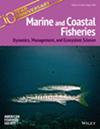Do sustainable development goals (SDGs) boost green productivity in national marine fisheries? International evidence
Abstract
Objective
This study examines the determinants of green total factor productivity in marine fisheries, considering the role of Sustainable Development Goal 14 (SDG 14) in promoting sustainable marine resource utilization and conservation.
Methods
This study employs panel data from 57 countries between 2001 and 2021 to estimate efficiency scores through the directional distance function and the Malmquist–Luenberger model by incorporating inputs (labor, fishing vessels, and energy consumption) and outputs (gross ocean product and carbon dioxide emissions). A truncated regression analysis is conducted to explore the relationship between SDG 14 and green total factor productivity (GTFP) while controlling for financial resources and macroeconomic indicators.
Result
The findings indicate that SDG 14 significantly enhances both constant returns to scale (CRS) technical efficiency and variable returns to scale (VRS) pure technical efficiency, underscoring the importance of marine conservation and sustainable resource management. Additionally, financial resources (like green lending and government investment), research and innovation (like research and development, the number of researchers, and foreign funds), and macroeconomic factors (like the gross ocean product, gross domestic product, and inflation) positively influence green productivity.
Conclusion
The results underscore the importance of marine conservation and sustainable practices for enhancing GTFP in fisheries. Integrated policies focusing on financial investment, innovation, and macroeconomic stability are essential to achieve greater sustainability and efficiency in this sector.


 求助内容:
求助内容: 应助结果提醒方式:
应助结果提醒方式:


